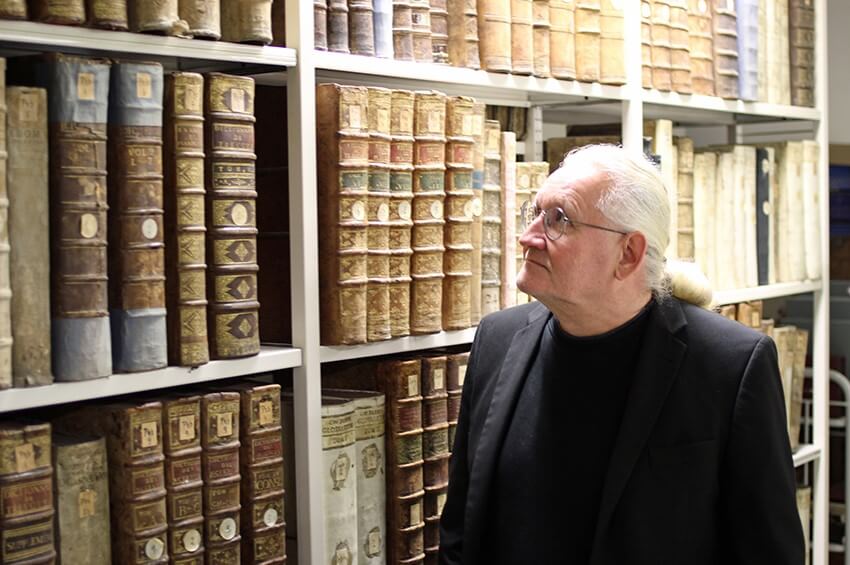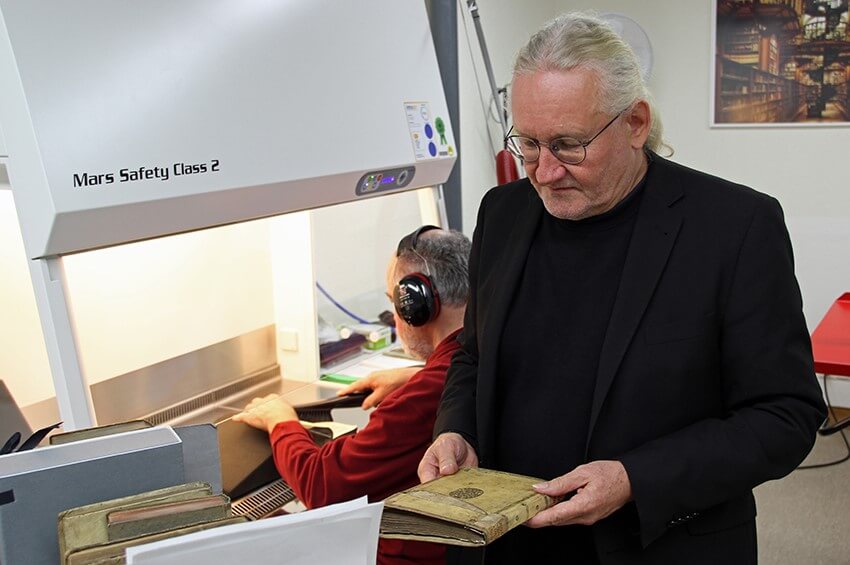Dr. Armin Schlechter-Head of the Collections Department, State Library Center Rhineland-Palatinate, Palatinate Landes Library
Professional background & career.
During my studies, I worked as a scientific assistant on the 'Handbook of Historical Book States in Germany'. I have gained important knowledge in the areas of acquisition and library history, which in particular complemented my middle and more recent history and showed the possibility of a practical application of the course.
After the end of the study, I cataloged medieval and modern manuscripts for several years as part of a DFG project. Afterwards I completed the training as a higher library service at scientific libraries. Then I took over the management of the manuscripts and old prints at the Heidelberg University Library. Today I head the collections in the Rhineland-Palatinate State Library Center
On the one hand, I specialize with my work in the library. On the other hand, I consider working with the historical stocks with all its facets to be a central element of library work. It does not lead to an ivory tower, but is an important element in the library, which is supplemented by networking at the state and federal level. In addition to archives and museums, libraries with historical stocks are cultural -friendly institutions.
Learn more about the Rhineland-Palatinate State Library Center here.
Photo credits Article Dr. Armin Schlechter: © LBZ / Ralf Niemeyer
Personal experiences.
I appreciate the diversity at work in the library, which also distinguishes the collections collections with its very different facets. It forms the basis for long-term work, for the use of all available resources and the claim to create best practice solutions. In addition, there are various options for advertising public relations for the library and its exciting stocks.
A central key moment was, starting with the 'Handbook of Historical Book States in Germany', dealing with grown collections, but also with outstanding individual pieces and its specific history. This led to the realization that the historical stocks in their intrinsic value have not yet been developed in depth.
In my view of catalogs, an important element of the library work are accompanied by catalogs, the segments of their own inventory open up in depth and prepare them for the public. I am also happy and regularly try to obtain third -party funds, such as that provides the 'coordination office for the preservation of the written cultural asset' and which benefit their own stocks.
Meaning & added value.
Working in a library is meaningful and enriching because it is one of the cultural institutions and thus stands for a segment of cultural tradition. With their stocks, libraries are an important reference factor for science, but also for education in all of their segments.
With their stocks, libraries provide verifiable knowledge and with their stocks are among the cultural memories of the country. They are freely accessible and with their diverse offers building blocks of democracy.
Libraries preserve and convey the cultural heritage of the country in exhibitions and in other event formats. Important elements are free accessibility in analog and digital form and networking with other cultural -friendly institutions, also with historical associations. In this way, the public is reached in a special way.
Recommendations.
Libraries offer diverse and exciting fields of work that enable specialization on the one hand, but also make many mixed workstations possible. They enable a career in the house itself or in other institutions and thus show good permeability.
A very good prerequisite for working in a library is a humanities studies. As a user, libraries, their functionalities and offers, get to know from public to the scientific library. The most important elements are certainly internships in the library to get to know the actual focus of the work.
Teamwork and networking, persistence in the pursuit of long -term goals and strategic planning as well as openness to new social and technical developments are important. Precise work is also an important factor.
Teamwork and communications play a major role not only at the level of the department, but also throughout the house; This is the only way to achieve long -term and ambitious goals. Above the level of one's own facility, network formation at the local level, at the state and federal level, are of great importance. They form the basis for being able to work on the further development of the library system in Germany.
Developments & future prospects.
The library work builds on the diverse stocks of the house, but must also deal with the social and technical developments. The future most important developments will be demographic and digital change. However, this must not lead to libraries question their core competencies. Rather, they have to work to remain an important cultural and scientific reference institution with their stocks.
In addition to the theoretical work, the practical element also plays a role in the area of historical stocks, which overlaps archeology. The best possible knowledge of the inventory is an important basis for working and teaching the historical media. A library with historical stocks also offers the opportunity to continue to work in your own subjects.
Another important segment is the participation in further training that is aimed at the library offspring, but also on smaller libraries.







